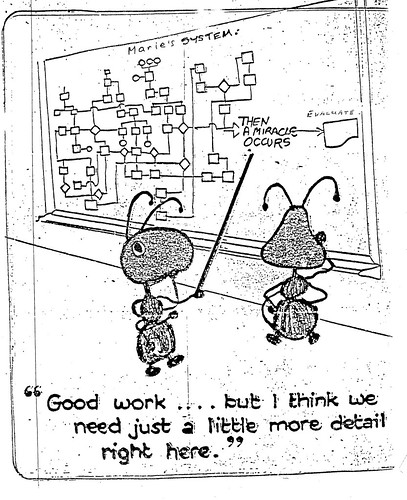I can't count the number of times I've sat in meetings and heard the team leader say, "OK, so by next month X will have happened. What's the next item on the agenda?", to which I've piped up: "Er, exactly how is it going to happen?".
Read MoreWhy you should review your ICT purchasing plans
 When the cost of calling an engineer out to fix your printer is greater than the price of a new printer, you know it’s time to review your printer spending plans. That’s the situation I was faced with when I joined one particular school: a top-quality printer had been bought, one which was so highly engineered that you couldn’t fiddle around with it yourself if it stopped working.
When the cost of calling an engineer out to fix your printer is greater than the price of a new printer, you know it’s time to review your printer spending plans. That’s the situation I was faced with when I joined one particular school: a top-quality printer had been bought, one which was so highly engineered that you couldn’t fiddle around with it yourself if it stopped working.
Another unfortunate consequence of having such an expensive printer was that it
Managing Change: The Importance of Planning
If you're going to bring about real change in an organisation you have to have a plan. You need a vision, of course, and you have to engage people and get them excited about the vision. But if you don't have a plan then nothing much will come of it. As the old saying goes, failure to plan is planning to fail.
I feel embarrassed writing that: it ought to be a no-brainer. Yet I can't count the number of times I've sat in meetings and heard the team leader say, "OK, so by next month X will have happened. What's the next item on the agenda?", to which I've piped up: "Er, exactly how is it going to happen?".

Good planning consists of the following elements:
- Having SMART targets in place, ie targets that are Specific, Measurable, Attainable, Relevant and Time-related.
- Having deadlines in place for their achievement.
- Where necessary, having 'milestones' in place, ie key events, with dates, by when things should be achieved in order to keep on track.
- Knowing who is going to be responsible for what.
- Having a mechanism whereby progress can easily be recorded and viewed. I think for a lot of purposes you don't need dedicated project-management software for this: a spreadsheet will do the job if used properly.
- Above all, having regular and frequent review meetings to see if the work is still on course to be completed by the agreed dates, and if not, the reasons for that, and what might be done about rectifying the situation.
These are not the only considerations. In order for the plan to be effective, team members must have a large say in its construction. I hate using buzz words like 'ownership', but in this case it really is appropriate: if people feel they're just being 'done to' then it may be hard for them to feel fully committed.
There should also be a no-blame culture. If people feel they're going to have strips torn off them if they admit to not having achieved something, or if there's a shoot-the-messenger culture, most people will simply take the easy way out and say nothing. That merely stores up problems for the future.
Finally, I think that as far as any planning involving technology is concerned, the flexibility to change or reinterpret goals is vital. When I worked in a Local Authority, each team had a one year plan which was derived from a three-year educational plan which was derived from a ten year community plan. Given that ten weeks is a long time in educational technology, feeling restricted by plans laid down ten years ago is madness. You may not be able to change the goal itself, but you may be able to change how its interpreted. For example, a goal like 'get parents more involved in their child's education by attending parents' evenings' might be interpreted in terms of checking their child's progress online and taking part in web-based discussions with their child's form tutor.
Certainly, spending plans should be revisited frequently. For example, a three year plan to equip every classroom with an interactive whiteboard may need to revised in the light of the entry of 3D projectors into the market.
The key thing in all of this is discussion, discussion, discussion. It may seem to slow the whole process down, but I think if you're hoping to achieve non-superficial changes that last, there really is no alternative.
Less Waffle, Please
One of the things that educators, especially teachers, are really good at is talking. That's not intended as a criticism, just an observation. Talking is what the job is all about, regardless of what people say about becoming a guide on the side instead of the sage on the stage. Whether it's giving instructions, explaining a point, or teasing out of a student what she or he really understands, talking is what we do best.
But as in every other aspect of life, there are times when you can have too much of a good thing, and here is a case in point. I recently questioned the usefulness of a 'book' called the Field Guide for Change Agents, on the grounds that it's not a guide at all and contains no strategic advice whatsoever. This attracted two comments to the effect that the process by which the 'guide' was produced was really good in itself.
I don't doubt it, although I have to wonder why it took a whole room full of people an hour to produce a 47 page book consisting of quotations and pictures. Be that as it may, what we have here is the following, as far as I can tell:
- A bunch of people think we need change.
- It's not that clear what change they'd like to see, or why it's necessary, but still.
- A book has been produced full of quotations about how wonderful we all are and how marvellous change is.
Nowhere in the book does it give much indication of how to bring that change about, except for a few slides along the lines of 'foster collaboration'. That's in a section called The Change Agent Toolkit -- another misnomer: imagine if you went to your local DIY store and bought what you thought was a set of screwdrivers, only to discover when you got home that all it contained was vague bits of advice instead of the tools and instructions on how to use them. The fact that this 'book' is free doesn't really negate that argument in my opinion.
If you're going to have a book of inspirational quotes, why not call it a book of inspirational quotes? But if you're going to produce a guide or a toolkit, then do that.
Reading this 'guide' reminds me of this cartoon:
(Sorry, I don't know to whom to attribute it.)
That, in turn, reminds me of all the worst team 'leaders' I have ever worked for. They would say, at the end of a meeting, "OK, so by next month X will have happened." And I would say, "How? By Divine Intervention?"
I have the utmost respect for the people who took part in producing this 'guide', and I'm sure the process was useful in many respects. But as a product, I have to say that, for me at least, the guide has questionable value.

